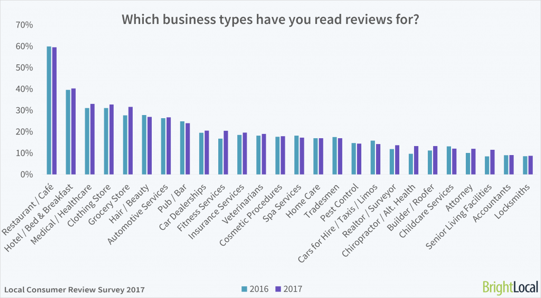Word of mouth is king when it comes to making purchase decisions. We recently focused on affiliate marketing – a natural extension of which is the importance of customer reviews in the buyer’s journey. Let’s consider the impact of these reviews and determine some strategies for collecting and leveraging customer reviews to promote your business to your target audience.
Why Do Customer Reviews Matter?
Consumers read an average of seven reviews before trusting a business, according to Bright Local’s 2017 Local Consumer Review Survey. This was up from six in the 2016 survey.
In the survey, which Bright Local has been doing since 2010, the top five business models people read reviews for were:
- Restaurants & Cafes
- Hotels/Bed & Breakfasts
- Clothing Stores
- Grocery Stores
- Hair/Beauty Services
But consumers also sought to learn about insurance services, pest control, attorneys, locksmiths and more.
Online reviews, though, don’t only influence purchasers. Reviews also matter to Google’s search engines. When it comes to retail, Google’s local ranking factors for search are “based primarily on relevance, distance, and prominence.” Relevance and distance aren’t impacted by reviews, but more reviews suggest to Google’s algorithm that the business is better known, which can improve a business’s local ranking.
B2B marketers also need to pay attention to reviews as a way of broadcasting customer perception and impacting customer purchases. After all, B2B companies are affected by online reviews on employee review sites, on product hunt sites, and in industry-wide research reports or surveys.
97% of consumers read online reviews for local businesses in 2017, with 12% looking for a local business online every day
How to Collect Customer Reviews
You might think that having no online reviews is a good thing — no news is good news, right? Yet you stand to increase sales by getting more reviews. The more the better, but even a few can help.
The first step in getting positive customer reviews is to provide outstanding customer service and an excellent product or service that people want to rave about. But, regrettably, not everyone is inclined to share their opinions — or at least not with you directly. The bad news is that people who have a negative experience aren’t likely to offer feedback to help you improve. Instead, they’ll simply leave and tell 15 of their friends that they did so and why.
Nevertheless, to leverage the power of positive reviews, you need to make a proactive effort to solicit feedback. In a reinterpretation of the “if you build it, they will come” mantra, “if you ask them, they will review.” Some 68% of consumers left reviews for local businesses when asked for their feedback, according to Bright Local.
Do it quickly. You’ll want to solicit input as soon after the transaction as you can. This will net you greater response rates and, likely, more detailed comments in the review as the experience with the service or product will be fresh in the reviewer’s mind.
Also, make a practice of responding to reviews — both positive and negative. Even simple follow-up comments or acknowledging the feedback helps to make the user feel heard, humanizing your brand and building trust for your business.
Don’t forget to give reviewers an easy visual scale to work with too. In fact, 58% of consumers say the star rating of a business is the most important factor. Plus, Bright Local’s 2015 survey noted a 154% increase in clicks for a 2nd position organic search result when it featured stars.
Regularly track your reviews by making it a habit to check out the various review platforms and social media outlets. After all, every one-star increase in a Yelp rating translated to a five to nine percent increase in revenue in a 2016 Harvard Business Review study.
It’s even a good idea to track your competitors’ reviews. Knowing what they have done well, or are doing poorly and how people feel about their product or service performance can give you competitive insight to make your own business better.
85% of consumers trust online reviews as much as personal recommendations
How to Leverage Those Reviews
Don’t just rest on your laurels when your brand or business receives a positive review. After all, positive reviews making 73% of consumers trust a local business more, according to Bright Local’s survey.
Get those reviews in front of your audience. Consider another Bright Local finding: 32% of consumers read local reviews on mobile apps in 2017 (a growth of 14% from 2016). In its 2015 survey, Bright Local noted a 55% increase in clicks for a second position organic search result when it featured a greater quantity of reviews.
Reviews can be turned into customer testimonials for the website. You might also highlight the reviews in social media posts and in email marketing campaigns. Or consider printing and displaying positive reviews in your store or office.
In monitoring your reviews, also keep an eye out for potential influencers. A brand loyalist who provides positive feedback and has many loyal followers in your niche market could become a brand evangelist on your behalf.
49% of consumers need at least a four-star rating before they choose to use a business
What About a Negative Review?
Even one negative review on the first page of a potential customer’s search results can prompt a loss of 22% of business. Businesses with two negatives on that first-page risk lose 44% of customers.
You can’t erase all negative reviews, of course. That would make savvy and skeptical online users question the legitimacy of your other reviews. According to Econsultancy, “68% of consumers trust reviews more when they see both good and bad scores.”
What you can do is respond in a clear, helpful, friendly way. If your potential buyers are going to see a negative review, make sure that they also see how your company handled the situation in a logical, compassionate way.
Always reply to negative reviews. Even if you aren’t able to win over a new customer with your response, you’ll at least share your side of the story and build trust by showing how you value customer/client experience.
Now, recognizing the importance of online reviews, it’s up to you to get out there and solicit feedback, monitor the reviews you do get, respond to your detractors, and put the positive accolades into rotation in campaigns, social media, and on your website to start shaping prospective buyers’ perspective today.
Need help integrating a review system with your eCommerce platform? We can help.
Sources
Bright Local. (2017). Local Consumer Review Survey. https://www.brightlocal.com/learn/local-consumer-review-survey/
Chowney, N. (2012, Jan. 12). Bad Reviews Improve Conversion by 67%.
DeNisco Rayome, A. (2017, April 19). Best Practices for Managing Online Reviews of Your Business. https://www.techrepublic.com/article/7-best-practices-for-managing-online-reviews-of-your-business/
Hinckley, D. (2015). New Study: Data Reveals 67% of Consumers are Influenced by Online Reviews. https://moz.com/blog/new-data-reveals-67-of-consumers-are-influenced-by-online-reviews
Luca, M. (2016). Reviews, Reputation, and Revenue: The Case for yelp.com. https://www.hbs.edu/faculty/Pages/item.aspx?num=41233
Sellas, B. (2017, Jan. 4). Online Reviews will Dominate Marketing Success in 2017. https://bsquared.media/online-reviews-dominate-marketing/




